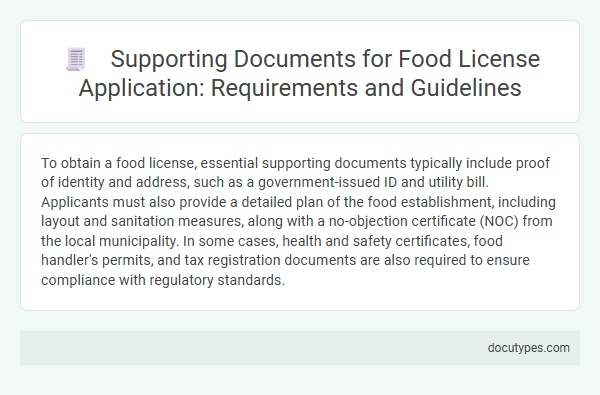To obtain a food license, essential supporting documents typically include proof of identity and address, such as a government-issued ID and utility bill. Applicants must also provide a detailed plan of the food establishment, including layout and sanitation measures, along with a no-objection certificate (NOC) from the local municipality. In some cases, health and safety certificates, food handler's permits, and tax registration documents are also required to ensure compliance with regulatory standards.
Introduction to Food License Supporting Documents
Obtaining a food license requires submitting specific supporting documents to verify compliance with health and safety regulations. These documents ensure that Your establishment meets all legal standards for food handling and distribution.
- Identity Proof - Documents like a government-issued ID or passport confirm the identity of the applicant.
- Address Proof - Utility bills or rental agreements demonstrate the physical location of the food business.
- Business Registration Certificate - Official papers that validate the legal status of Your food enterprise.
Importance of Accurate Documentation
| Document Type | Description | Importance |
|---|---|---|
| Identity Proof | Government-issued ID such as passport, driver's license, or national ID card. | Verifies the applicant's legal identity, ensuring accountability and traceability. |
| Address Proof | Utility bills, lease agreement, or property tax receipts. | Confirms the location of the food establishment, critical for inspection and regulatory compliance. |
| Business Registration Certificate | Legal document showing the registration of the food business entity. | Establishes the business's legitimacy and eligibility for licensing. |
| Food Safety Management Plan | Detailed documentation of hygiene practices and food handling procedures. | Demonstrates adherence to food safety regulations and reduces risks of contamination. |
| Proof of Training | Certificates of completion for food handler training or hygiene courses. | Ensures staff are knowledgeable about food safety standards, enhancing overall compliance. |
| Layout Plan | Blueprint or schematic of the food establishment layout. | Facilitates inspection of hygiene zones and storage areas for regulatory approval. |
| Fee Payment Receipt | Official evidence of payment for the food license application fees. | Confirms financial compliance and initiates license processing. |
Importance of Accurate Documentation: Precise and complete supporting documents play a crucial role in obtaining a food license. Accurate documentation ensures compliance with health regulations, speeds up the application process, and prevents legal complications. Errors or omissions can lead to application rejections, delays, or fines, impacting business operations and reputation.
Commonly Required Supporting Documents
Obtaining a food license requires submitting several commonly required supporting documents to ensure compliance with health and safety regulations. These documents help verify your business operations and maintain quality standards.
Commonly required supporting documents include a completed application form, proof of identity and address, and a layout plan of the food premises. You will also need a valid NOC from the local municipal authority and a certificate of incorporation if applicable. In some cases, additional documents such as food safety training certificates and equipment lists may be required to complete the application process.
Identity and Address Proof Guidelines
To apply for a food license, you must provide valid identity proof such as a government-issued ID card, passport, or Aadhaar card. Address proof documents include utility bills, rental agreements, or bank statements reflecting your business or residential address. Ensure your submitted documents are current and clearly legible to meet regulatory compliance.
Proof of Business Premises
What are the required supporting documents for a food license regarding proof of business premises?
Proof of business premises is essential to validate the location where food operations will be conducted. Common documents include property ownership deeds, lease agreements, or rental contracts that confirm legal occupancy.
Food Safety Management Plan Documentation
Documentation of a Food Safety Management Plan is essential for obtaining a food license, ensuring compliance with health regulations. These documents demonstrate a business's commitment to maintaining food safety standards throughout operations.
- Hazard Analysis and Critical Control Points (HACCP) Plan - Identifies potential food safety hazards and outlines control measures for prevention.
- Standard Operating Procedures (SOPs) - Details daily practices for handling, processing, and storing food to maintain hygiene and safety.
- Training Records - Provides evidence of staff education on food safety protocols and proper procedures.
Ownership and Authorization Papers
Ownership and authorization papers are essential supporting documents for obtaining a food license. These papers typically include property ownership certificates or lease agreements proving legal authorization to use the business premises. Submission of valid business registration and authorization letters ensures compliance with regulatory requirements for food license approval.
Declaration and Affidavit Requirements
Obtaining a food license requires submitting specific supporting documents, including declarations and affidavits. These documents confirm compliance with food safety and hygiene regulations.
- Declaration of Food Safety Compliance - This document affirms that your establishment adheres to all prescribed food safety standards set by regulatory authorities.
- Affidavit of Non-Contamination - A sworn statement ensuring that the food products handled or sold are free from harmful substances and contaminants.
- Declaration of Business Details - Contains verified information about the food business, including ownership, location, and operational scope.
Submitting accurate declarations and affidavits is essential to meet regulatory requirements for your food license.
Specific Documents for Different Food Businesses
Food license requirements vary depending on the type of food business you operate. Specific supporting documents must be submitted to comply with regulatory standards and ensure food safety.
Restaurants typically need a health and safety certificate, proof of premises ownership or lease, and identity verification documents. Food manufacturers require additional permits such as factory registration, pollution control clearance, and a detailed list of ingredients used in production.
What Are the Required Supporting Documents for a Food License? Infographic

